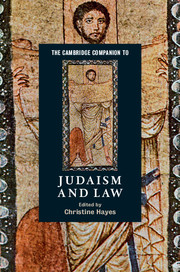Book contents
- The Cambridge Companion to Judaism and Law
- Cambridge Companions to Religion
- The Cambridge Companion to Judaism and Law
- Copyright page
- Contents
- Contributors
- Acknowledgments
- Introduction: Can We Even Speak of “Judaism and Law”?
- Part I Law as Constitutive of Biblical and Premodern Jewish Religious Expression
- Part II Enlightenment, Emancipation, and the Invention of Jewish “Religion”
- 6 From Enlightenment to Emancipation
- 7 Enlightenment Conceptions of Judaism and Law
- 8 Rethinking Halakhah in Modern Eastern Europe: Mysticism, Antinomianism, Positivism
- 9 Antinomianism and Its Responses in the Nineteenth Century
- 10 New Developments in Modern Jewish Thought: From Theology to Law and Back Again
- Part III Judaism and the Secular Jewish State
- Index
- Cambridge Companions to Religion (continued from page iii)
- References
10 - New Developments in Modern Jewish Thought: From Theology to Law and Back Again
from Part II - Enlightenment, Emancipation, and the Invention of Jewish “Religion”
Published online by Cambridge University Press: 23 February 2017
- The Cambridge Companion to Judaism and Law
- Cambridge Companions to Religion
- The Cambridge Companion to Judaism and Law
- Copyright page
- Contents
- Contributors
- Acknowledgments
- Introduction: Can We Even Speak of “Judaism and Law”?
- Part I Law as Constitutive of Biblical and Premodern Jewish Religious Expression
- Part II Enlightenment, Emancipation, and the Invention of Jewish “Religion”
- 6 From Enlightenment to Emancipation
- 7 Enlightenment Conceptions of Judaism and Law
- 8 Rethinking Halakhah in Modern Eastern Europe: Mysticism, Antinomianism, Positivism
- 9 Antinomianism and Its Responses in the Nineteenth Century
- 10 New Developments in Modern Jewish Thought: From Theology to Law and Back Again
- Part III Judaism and the Secular Jewish State
- Index
- Cambridge Companions to Religion (continued from page iii)
- References
- Type
- Chapter
- Information
- The Cambridge Companion to Judaism and Law , pp. 287 - 314Publisher: Cambridge University PressPrint publication year: 2017

